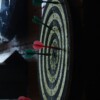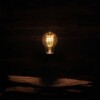In the modern world, youth culture, and especially collegiate culture, is often activist culture. Among the college-aged, a freshness of vision combines with just enough personal skill and knowledge to beget (at least sometimes) a burning sense of responsibility.
One phrase associated with collegiate protest culture, and with social activism in general, is “be the change.” It’s not enough to virtue signal, or campaign from afar, or donate money. It’s better – more virtuous, more courageous – to put your very self on the line. It’s better to fully inhabit the ideal you’re striving for.
In recent years, I think, we’ve seen an upsurge in an activist spirit that goes “all in” on idealistic paradigms: back-to-the-land agrarianism; “trad” culture, with its uncompromising reclamation of deep heritage; science worshipping techno-cults; polyamorous, ownership-denying communitarianism; radical gender equality, sometimes to the point of gender obliteration; and even “restorationist” movements aimed toward bringing back old blood aristocracies.
These are extreme examples, directly affecting small percentages of the population, but the drive to courageously embody change is present in small doses everywhere and is a natural reaction to the superficial, virtue signaling, appearance-obsessed “Society of the Spectacle” I discussed in my last blog post. Increasingly, a critical mass of our postmodern American population is reaching a state of glutted satiety with “signaling” culture. In response they seek experiences that penetrate to the marrow, reach the inner soul, or plunge back through time with the promise of grasping something eternal.
The problem is, once it’s assumed, this responsibility to embody self-discerned truth – however you conceive of it – is psychologically crushing.
We were not meant to invent our own heavens and then sculpt ourselves into the gods or saints that must inhabit them. We were not meant to shout with lone, bespoke, righteously indignant voices into a sightless void, shaping utopias with our cries. This is a form of the “heroic atheism” described by Charles Taylor in his Secular Age, and it is implicitly embraced even by people of faith who are discontent with the structures they’ve inherited. The line, now, between “faith” (literally, fidelity to a higher power) and activistic self-expression is, in some quarters, almost completely blurred. The result is a widespread sense of burden. All of us are heavy-laden. We decry our heavens and then construct them from our own flesh, cannibalizing ourselves even as we become Atlases of our own worlds.
Maybe America, the land of the “self-made man,” has always lent itself to this destructive heroism, with its bootstrapping myths about pioneers, entrepreneurs, and street urchins made good. Our postmodern radicalisms of the spirit, usually concerning issues of embodied identity (whether gender, sexuality, class and monarchy, radical equality, or deep “traditionalism”) are but the final frontier in this individualistic, utopian quest. With little else left to conquer and transform, we must conquer our fleshly trappings – our organs and blood.
But Jesus said, “My yoke is easy and my burden is light.” In the same way that we must offer our beloved goods to God, lest we idolize them (this is the lesson of Abraham and Isaac), we must also offer our burdens.
Strangely, however, we feel that these burdens are ours in a way that even our goods – even our children – are not. Something in us could not possibly relinquish them, any more than we can voluntarily relinquish our own breath. These burdens are somehow inseparable from us: whether they are our senses of responsibility, indignation, and righteous anger, or our callings toward pressing, high-stakes vocations (even if we can’t quite define them). What are we if we are not our innermost dreams, our secretly-held ambitions, our very senses of self at a basic level, harking to deepest memory, when we first began to understand the meaning of our own names?
Nevertheless, these things are burdens, and they should be yielded up if we are to be faithful. Jesus will allow us to withhold nothing, and He will look at us with stern and penetrating eyes until we have yielded all of our baggage to Him.
He demands that we empty our spiritual purses and pockets – not to mention our rucksacks and wagons. He demands that we take off our armor (and so many things can function as “armor” against his piercing sight). He demands that we take off even our basic coverings, and remove the devices beneath them that shape us, pad us or warm us against all that lies outside.
Because the fact is, not even these things are ours, and even our breath is forfeit. It is madness for us, in the end, to carry even one little thing – even our very names, our very breath, our very hearts – into the throne room of God.
We don’t know who we are, and we don’t know what burdens we are meant to carry. We cast about with greedy eyes for gifts to hold and bring into eternity, but the very acts of grasping and holding betray us. Our lives are hidden with Christ in God, and He alone will give us “new names” that reflect the true destinies that our eyes are too dim to see.
And lest we become repelled by a call to passivity or quietism in this unburdening, I think we can be sure of this: While Jesus takes our burdens, he does not take our yoke. Instead, he privileges us to move with Him, alongside Him, learning his steps and following the path He has laid for us, so that we might gradually discover, like a sun slowly dawning, the destination He has prepared.
To sacrifice our burdens, then – the onerous responsibility to “bootstrap” our own identities and our own utopias – is to be called into a race and an adventure of unpredictable forward movement and “conquered” terrain, until the land itself gives way to the celestial Sea of Glass.
























Katie, you uniquely describe very well here what seems to be an era of self-destruction in our society. Kudos for reminding us of mankind’s preoccupation with self and narcissism–and the solution: Christ at the center.
Katie,
I have admired your posts and choose to read them, even though I have retired and am no longer in Academia.
Let me suggest another way of looking at the material you shared in the past today, November 6, 2023. You write: “Nevertheless, these things are burdens, and they should be yielded up if we are to be faithful. Jesus will allow us to withhold nothing, and He will look at us with stern and penetrating eyes until we have yielded all of our baggage to Him.”
I love your material about yielding our burdens at Jesus. However, I would suggest another way of putting this particular thought. These burdens (our senses of responsibility, indignation, and righteous anger, or our callings toward pressing, high-stakes vocations) need to be yielded up to Jesus for us to live truly flourishing lives. Such lives follow from withholding nothing from Him. He looks at us with inviting and welcoming eyes that appeal to us to yield all our baggage to HIm that we might thrive, yoked to Him and learning from Him how to live the lives He designed us to live.
Katie–Thank you for reminding us of the comfort we have in Christ. We are easily fooled by the surface attraction of our own paradigms, but the Lord’s path, difficult as it may be, is one that provides much more refreshing than we could provide for ourselves.
Thoreau would have to be the poster-child for the Utopian “bootstrapping” that you describe here, but he also said this: “Public opinion is a weak tyrant compared with our own private opinion.” Giving our lives over to Christ would have to be a relief. For one thing, he’s no tyrant.